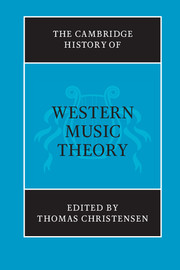Book contents
- Frontmatter
- Introduction
- PART I DISCIPLINING MUSIC THEORY
- PART II SPECULATIVE TRADITIONS
- 4 Greek music theory
- 5 The transmission of ancient music theory into the Middle Ages
- 6 Medieval canonics
- 7 Tuning and temperament
- 8 The role of harmonics in the scientific revolution
- 9 From acoustics to Tonpsychologie
- 10 Music theory and mathematics
- PART III REGULATIVE TRADITIONS
- PART IV DESCRIPTIVE TRADITIONS
- Index of authors
- Index of subjects
- References
8 - The role of harmonics in the scientific revolution
from PART II - SPECULATIVE TRADITIONS
Published online by Cambridge University Press: 28 March 2008
- Frontmatter
- Introduction
- PART I DISCIPLINING MUSIC THEORY
- PART II SPECULATIVE TRADITIONS
- 4 Greek music theory
- 5 The transmission of ancient music theory into the Middle Ages
- 6 Medieval canonics
- 7 Tuning and temperament
- 8 The role of harmonics in the scientific revolution
- 9 From acoustics to Tonpsychologie
- 10 Music theory and mathematics
- PART III REGULATIVE TRADITIONS
- PART IV DESCRIPTIVE TRADITIONS
- Index of authors
- Index of subjects
- References
Summary
This chapter aims to highlight the influential role that harmonics played in the “scientific revolution,” which historians of science see taking place in Western thinking between the sixteenth and early eighteenth centuries. Between the publication of Nicolaus Copernicus’s De revolutionibus in 1543 and Isaac Newton’s Principia mathematica in 1687, a profound transformation took place in understanding about the laws governing the universe and man’s place within it. Why harmonics should have been relevant to this process may require some explanation, especially since music itself is now classified among the arts rather than the sciences, and harmonics is no longer recognised as a viable scientific discipline.
In its narrowest sense, harmonics has been understood since the Greeks as the study of the mathematical relations (harmonia) underlying the structure of audible music. This branch of mathematics was also known as “canonics,” a term recalling Euclid’s Sectio canonis (fourth to third century BCE), in which the propositions of harmonics are demonstrated as mathematical theorems. Greek harmonic writings which focused on musical organization and structure characteristically fell into one of two categories, following respectively the “Pythagorean” and the “Aristoxenian” schools of thought. There was a traditional component of physical explanations for these mathematical relationships (e.g., the weights of Pythagoras’s hammers), but this was only put on a sound experimental footing in the seventeenth century, by which time the field had been redefined as acoustics.
- Type
- Chapter
- Information
- The Cambridge History of Western Music Theory , pp. 223 - 245Publisher: Cambridge University PressPrint publication year: 2002
References
- 30
- Cited by



